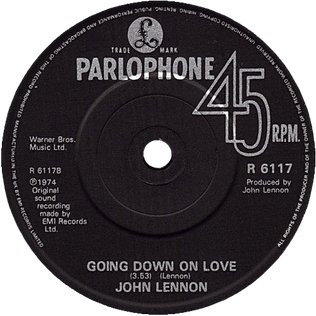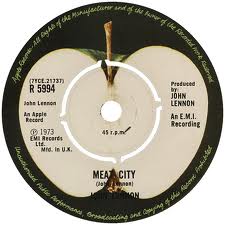Related Research Articles
"Surprise, Surprise " is a song written by John Lennon that was first released on his 1974 album Walls and Bridges. Elton John contributes harmony vocals to the song.
"Well Well Well" is a song by English musician John Lennon from his 1970 album John Lennon/Plastic Ono Band. The eighth and longest track on the album, "Well Well Well" features an aggressive guitar sound, screaming vocals and a pounding backing track.

"My Mummy's Dead" is the closing song on the album John Lennon/Plastic Ono Band by John Lennon. The song was also released on a Mexican EP that also contained "Mother", "Isolation" and "Look at Me".

"Going Down on Love" is a song by John Lennon, released as the first track on his 1974 album Walls and Bridges. It was also released as the B-side of Lennon's "Jealous Guy" single in 1985.

"I'm Losing You" is a song written by John Lennon and released on his 1980 album Double Fantasy. It was written in Bermuda in June 1980, after several attempts by Lennon to call his wife, Yoko Ono, who remained in New York. The song is also available on the 1982 compilation The John Lennon Collection, the 1998 boxset John Lennon Anthology, the one disc compilation Wonsaponatime, the 2005 two disc compilation Working Class Hero: The Definitive Lennon and in 2010 for the Gimme Some Truth album. The song was also featured in the 2005 musical Lennon.
"Tight A$" is a song written by John Lennon released on his 1973 album Mind Games. The song is also included in the 2010 compilation album, Gimme Some Truth. A tongue-in-cheek rocker, Lennon managed to get the phrase "tight ass" past the censors.
"Aisumasen (I'm Sorry)" is a song written by John Lennon released on his 1973 album Mind Games. The song is included on the 1990 box set Lennon.
"Out the Blue" is a song written by John Lennon and originally released on his 1973 album Mind Games. The song is included on the 1990 boxset Lennon, the 2005 two-disc compilation Working Class Hero: The Definitive Lennon, the 2010 album Gimme Some Truth and the 2020 compilation album Gimme Some Truth. The Ultimate Mixes.
"I Know (I Know)" is a song written by John Lennon released on his 1973 album Mind Games. The song is included on the 1998 box set John Lennon Anthology and the 2020 compilation album Gimme Some Truth. The Ultimate Mixes.

"Meat City" is a song written by John Lennon, released as the 12th and final track on his 1973 album Mind Games. The song is also the B-side of the single of the same name, and is included on the 2010 album, Gimme Some Truth.
"Nobody Loves You (When You're Down and Out)" is a song written by John Lennon released on his 1974 album Walls and Bridges. The song is included on the 1986 compilation Menlove Ave., the 1990 boxset Lennon, the 1998 boxset John Lennon Anthology, the 2005 two-disc compilation Working Class Hero: The Definitive Lennon, and the 2010 boxset Gimme Some Truth.

"Sisters, O Sisters", also known as "Sisters O Sisters", is a song written by Yoko Ono that first appeared on John Lennon's and Yoko Ono's 1972 Plastic Ono Band album Some Time in New York City, backed by Elephant's Memory. It was also released as the b-side to the couple's "Woman Is the Nigger of the World" single. It has been covered by a number of artists, including Le Tigre and Tater Totz.
"Born in a Prison" is a song written by Yoko Ono and first released on her 1972 album with John Lennon Some Time in New York City as part of their Plastic Ono Band project.
"New York City" is a song written by John Lennon that was first released on Lennon's and Yoko Ono's 1972 Plastic Ono Band album Some Time in New York City.

"What You Got" is a song written by John Lennon that was first released on his 1974 album Walls and Bridges. It was later released as the B-side to his top 10 #9 Dream single.
"Bless You" is a song written by John Lennon that was first released on his 1974 album Walls and Bridges. It is a ballad expressing his love for his wife Yoko Ono, from whom he was separated at the time. Alternative versions appeared on the compilation albums Menlove Ave. and John Lennon Anthology
"Scared" is a song written by John Lennon that was first released on his 1974 album Walls and Bridges. Alternate versions were subsequently released on the compilation albums Menlove Ave. and John Lennon Anthology.
"Sunday Bloody Sunday" is a song written by John Lennon and Yoko Ono that was first released on their 1972 Plastic Ono Band album with Elephant's Memory, Some Time in New York City. The song addresses the Bloody Sunday massacre of 1972 and is one of two on the album that addresses the contemporary Northern Ireland conflict, "The Luck of the Irish" being the other.

"Beef Jerky" is an instrumental written by John Lennon that was released on his 1974 album Walls and Bridges and also as the b-side of the lead single from that album, the #1 hit "Whatever Gets You thru the Night."
References
- ↑ Erlewine, S.T. "Walls and Bridges". AllMusic . Retrieved 18 December 2012.
- 1 2 3 4 5 6 Noyer, Paul Du (2010). "Walls and Bridges". John Lennon: The Stories Behind Every Song 1970–1980 (Rev. ed.). London: Carlton Books Ltd. p. 105. ISBN 978-1-84732-665-2.
- 1 2 3 4 5 6 7 8 9 Blaney, J. (2007). Lennon and McCartney: together alone : a critical discography of their solo work. Jawbone Press. pp. 93–94. ISBN 978-1-906002-02-2.
- 1 2 3 4 5 6 7 8 9 Urish, B.; Bielen, K. (2007). The Words and Music of John Lennon. Praeger. p. 58. ISBN 978-0-275-99180-7.
- 1 2 3 4 5 6 7 Rogan, J. (1997). The Complete Guide to the Music of John Lennon. Omnius Press. pp. 89, 144. ISBN 0-7119-5599-9.
- ↑ Giuliano, G. (2001). Lennon in America: 1971–1980, Based in Part on the Lost Lennon Diaries. University of Michigan. p. 63. ISBN 978-1-4616-3561-1.
- 1 2 3 Ginell, R.S. "Flash Harry". AllMusic . Retrieved 19 December 2012.
- ↑ Erlewine, S.T. "Walls and Bridges". AllMusic . Retrieved 19 December 2012.
- 1 2 3 Madinger, C. & Easter, M. (2000). Eight Arms to Hold You. 44.1 Productions. pp. 89–90. ISBN 0-615-11724-4.
- ↑ Sheff, D., Lennon, J. & Ono, Y. (2000). All We Are Saying: The Last Major Interview with John Lennon and Yoko Ono . Macmillan. pp. 216–217. ISBN 978-0-312-25464-3.
{{cite book}}: CS1 maint: multiple names: authors list (link) - ↑ Henderson, Erica (20 March 2023). "10 Best Harry Nilsson Songs of All Time". SingersRoom. Retrieved 30 January 2024.
- ↑ Noyer, Paul Du (2010). "Walls and Bridges". John Lennon: The Stories Behind Every Song 1970–1980 (Rev. ed.). London: Carlton Books Ltd. p. 98. ISBN 978-1-84732-665-2.
- ↑ "Old Dirt Road". The Beatles Bible. 16 August 2010. Retrieved 23 July 2020.